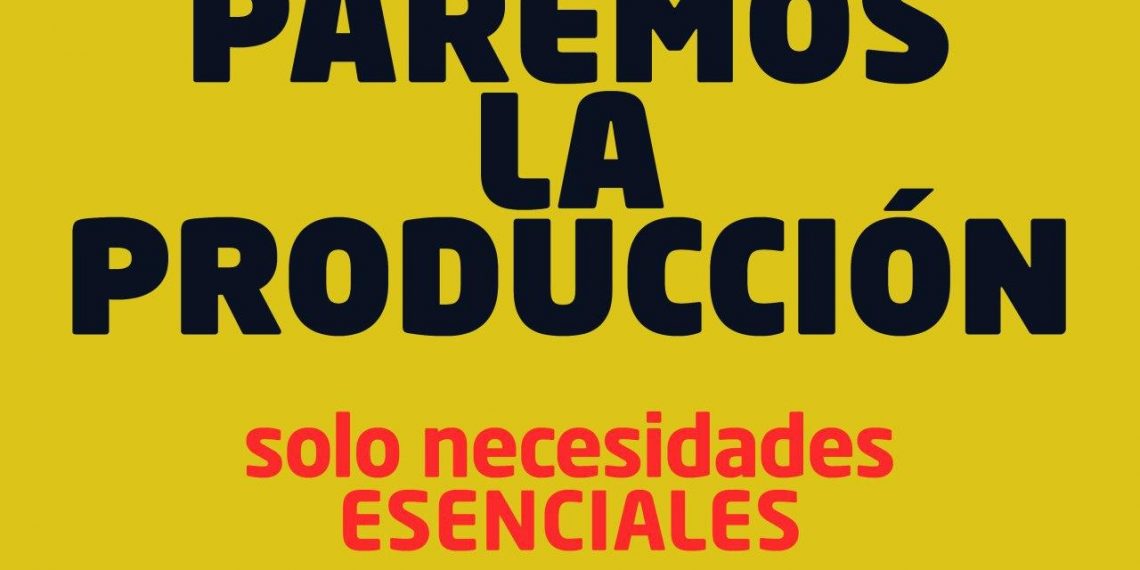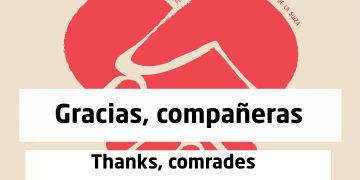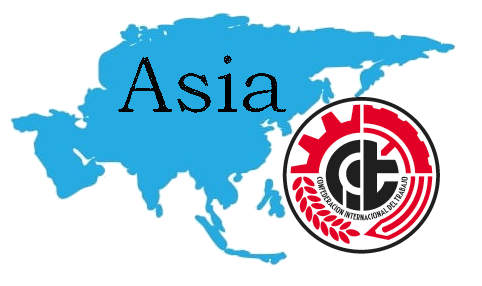CNT has presented a 15-point list demanding that all non-essential productive activities where working from home is not possible are stopped, that the essential sectors are reinforced and that social measures are introduced to protect workers.
CNT considers that all the measures taken by the Government are not enough for the vast majority of workers. According to the regulations introduced, implementing security measures, such as working from home, is up to the good will of the employers. This leaves the workforce exposed to a serious health hazard when commuting to work or when carrying out non-essential jobs. Also, those other sectors that are doing most to fight off the health crisis brought about by Covid-19, are left in a situation of weakness and helplessness, something that CNT finds very concerning.
Thousands of workers have already been laid-off or have suffered ERTEs (Expediente de Regulacion Temporal de Empleo; Temporary Labour Force Reduction), dismissals and termination of contracts. Also, workers on zero-hour contracts, false self-employed and freelancers have seen their livelihoods vanish into thin air. All in all, millions of workers in Spain are facing an uncertain future, are helpless and at risk. The provisions in Royal Decree 8/2020 of March 17, outlining the economic measures proposed to ease the economic impact of the health crisis, may look very well on paper, but they fly in the face of the backwards outlook of Spanish business owners.
For this reason, CNT demands that the government takes urgent measures to ensure that the working class is not harmed by the health crisis. Workers safety must be an absolute priority: make work from home compulsory when possible; if it is not, stop all non-essential activity; revert layoffs; direct contracts for any jobs required to overcome the crisis; and special protective measures for sectors such as domestic workers. Undoubtfully, training and education must be part of the urgent measures implemented.
Equally, people’s safety must be guaranteed. This is the right time to take bold and decisive steps to exercise our right to a work-life balance. CNT also demands that everyone belonging to the so-called risk groups of the disease are given sick leave, that incarcerated workers over 65 or suffering chronic illnesses are released and that Deportation Centres are closed. These measures must be funded by a special tax on large fortunes.
CNT demands the following 15 points:
1. Immediate implementation of work from home in all companies where it is technically feasible
Work from home must be implemented in companies with any degree of previous experience in this practice. Also, this arrangement must be made compulsory for those others that haven’t tried it before. The government’s Royal Decree allows companies not willing to implement work from home to do so and to continue risking the health of the workforce and of the rest of society. Indeed, that’s what’s happening.
That is why all companies must adapt their structures as much as possible to work from home. To do so, they must research all the technical means necessary for collaborative work from home and provide these accordingly.
2. Stop all non-essential productive activity immediately and automatically if work from home is not possible
Any companies with a profit larger than 3,000 euros per worker over the last financial year must automatically grant 30 days of paid leave for all staff members. Companies with profits smaller than these must request an ERTE due to force majeure. Also, companies in the first instance, must request an ERTE due to force majeure once the initial 30-days paid leave has expired.
To this effect, the Labour and Social Security Inspectorate must be expressly declared an essential service.
3. Extraordinary training measures
Ingenious and innovative measures must be taken to ensure the safety of all workers whose job can’t be stopped or done from home. It is often said in Spain that lack of training hinders innovation in economy, that workers low educational level limits their employability and that training must be understood as an ongoing endless task. Indeed, workers are often encouraged to train and prepare for a shifting labour market. It now seems to be the perfect moment for companies to implement mass online training programmes for that part of the workforce who can’t work from home.
Consequently, all companies must effectively and immediately develop the provisions of Article 23 of the Workers’ Statute, so staff members are paid while production is stopped by taking part in online training programmes.
4. Extraordinary measures for the organisation of work
This is the right time to take bold and decisive steps to exercise our right to a work-life balance. In this respect, the provisions in Royal Decree 8/2020 of March 17, outlining the economic measures proposed to ease the economic impact of the health crisis, may look very well on paper, but they fly in the face of the backwards outlook of Spanish business owners. Nowadays, it is crucial to seek a redistribution of waged labour and a reduction in working hours to allow time to look after dependants and those most vulnerable in society, to facilitate the work of health workers and the distribution of basic products and services and to resume activity after the lockdown.
Therefore, all companies must consider work time redistribution when required and urgently prepare new working hours, shifts (increasing their number where necessary), time pools, etc., to be ready when the quarantine is eased.
5. Placing the private production system at society’s disposal, for whatever is necessary
The fact that it is possible, and crucial, to adapt production in certain private companies and sectors to help deal with this health emergency, must be urgently addressed. There are spontaneous self-organised initiatives to design and 3D-print basic medical equipment, to manufacture masks in sewing workshops, to provide community support networks for the most vulnerable…All these initiatives must be organised on a mass scale.
We’re facing an unprecedented situation and ambitious measures are required. At the same time, ERTEs will be applied in companies and this will result in a massive reduction of available resources at a time when the health system is about to collapse. It is imperative that these resources are not wasted. Hotels are already been used to receive patients and their staff are being trained to carry on with this essential work. Similarly, other sector must be adapted to provide goods and services accordingly to the current needs: equipment and premises must be decontaminated; disposable masks, gloves, gowns and ventilators must be manufactured; disinfectants must be produced; food must be delivered to the elderly or handicapped…
The first step is researching and implementing any possible adaptation of local companies, regardless of the sector, to provide equipment and services to the health system, social services or any other body involved in organising, planning and managing the response to the health crisis. This would also reduce the numbers of workers affected by ERTEs.
6. Reinforcing essential services through direct and immediate recruitment of the necessary workforce
An increase in the workforce of companies engaged in essential services and of those others made available to these services, as previously proposed, must be immediately carried out, to ensure they’re working at full capacity. To this extent, the employment service will select unemployed workers as required, to be hired with temporary contracts.
7. Increase protection to workers in essential services
Implement new working protocols and introduce additional precautionary measures. Third-party health and safety services have failed miserably. Therefore, these services must be placed under the public direction of the Instituto Nacional de Seguridad y Salud en el Trabajo [National Institute of Health and Safety in the Workplace] and the relevant health and safety bodes of local authorities.
8. Urgent implementation of a new work-life balance leave
Article 39.3 of the Spanish Constitution states that “Parents must provide their children whether born in or out of wedlock, with assistance of every kind while they are still underage and in other circumstances in which the law is applicable”. Accordingly, any worker looking after his or her children or dependents must get paid leave, as proposed in Article 37.3 of the Workers’ Statute.
CNT considers 9. All dismissals taking place during the state of alarm must be immediately declared null and void
To protect workers’ rights and to avoid abuse by companies, all dismissals must be declared null and void, except those expressly covered by the emergency measures and duly authorised by the labour authority. This ban on dismissals must be in place for as long as the state of alarm lasts and in the event of any subsequent declaration of a state of national emergency or martial law, as well as for 180 extra days after any of these situations is lifted.
10. Sick leave to cover all risk groups
All workers in one of the risk groups of the disease (over 60 years of age, with previous cardiovascular conditions, high blood pressure, diabetes, chronic pulmonary diseases or cancer, suffering of a weak immune system and pregnant women) and employed in an essential sector, must be given temporary sick leave immediately, to protect their health and their lives and due to occupational incident. Payment for such sick leave must be a 100% of the normal salary from day one.
11. Specific measures for domestic workers
Employed and self-employed domestic workers must be covered by the same protective measures as any other employed and self-employed workers, including the right to unemployment benefits.
12. Taxation of large fortunes
Large fortunes must be taxed with a special duty to cover the expenses of the social emergency that the working class is already suffering.
13. Freeze rent payments, mortgage instalments and utilities bills
Rent payments and mortgage instalments on the first residence must be frozen for the duration of the state of alarm, or of any other emergency situation in place at any given time. Similarly, utilities bills for water, electricity, gas and telecommunications must be frozen for the same period of time.
14. Reinforce public health and social services
Take over private health care centres without financial compensation. Place retirement homes under public management to guarantee the dignity, the right to life and the health of the whole population.
15. Social measures and human rights
Incarcerated workers over 65 years of age or suffering serious chronic diseases, that have not committed serious crimes such as rape or femicide, must be released immediately. All deportation centres must be closed, deportations stopped and the Foreigners Law must be repealed.
Also available in:
 Español (Spanish)
Español (Spanish)













